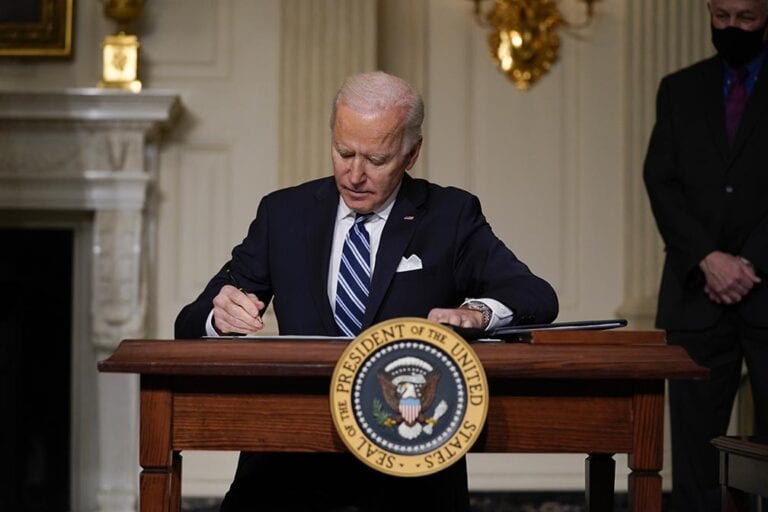WASHINGTON — In an effort to ensure “more resilient and secure” transport of critical supplies and essential goods, President Joe Biden on Wednesday, Feb. 24, signed an executive order calling for a comprehensive one-year review of the U.S. supply chain.
“The bottom line is simple: The American people should never face shortages in the goods and services they rely on, whether that’s their car or their prescription medicines or the food at the local grocery store,” Biden said during his remarks before signing the order.
The president pointed to shortages of personal protective equipment (PPE) during the COVID-19 pandemic, noting stories of medical personnel resorting to washing and reusing face masks.
“That should never have never happened. And this will never happen again in the United States, period,” he said. “We shouldn’t have to rely on a foreign country — especially one that doesn’t share our interests or our values — in order to protect and provide our people during a national emergency.”
Under the order, federal departments and agencies are directed to identify ways to protect the nation’s supply chain against a range of risks and vulnerabilities, thereby protecting the U.S. from shortages of critical products.
The order calls for an immediate 100-day review addressing vulnerability in the supply chains for four key products, including APIs (the part of a pharmaceutical product that contains the active drug); critical minerals required for defense, technology and other products; semiconductors and advanced packaging; and large-capacity batteries, such as the ones used in electric vehicles.
A more in-depth one-year review will include the following:
- A focus on six key sectors: The sectors include the defense industrial base; the public health and biological preparedness industrial base; the information and communications technology (ICT) industrial base; the energy sector industrial base; the transportation industrial base; and supply chains for agricultural commodities and food production.
- A set of risks for agencies to consider in their assessment of supply-chain vulnerabilities: Agencies and departments will review risks to supply chains and industrial bases and identify critical goods and materials within supply chains, the manufacturing or other capabilities needed to produce those materials, and any vulnerabilities created by failure to develop domestic capabilities. Agencies and departments are also directed to identify locations of key manufacturing and production assets, the availability of substitutes or alternative sources for critical goods, the state of workforce skills and identified gaps for all sectors, and the role of transportation systems in supporting supply chains and industrial bases.
- Recommendations on actions that should be taken to improve resiliency: Agencies are directed to make specific policy recommendations to address risks, as well as proposals for new research and development activities.
- A sustained commitment to supply chain resiliency: The government will commit to a regular, ongoing process of reviewing supply chain resilience, including a quadrennial review process.
- Consultation with external stakeholders: The government cannot secure supply chains on its own. It requires partnership and consultation with the American people. The order calls for the Biden administration to consult with outside stakeholders, such as those in industry, academia, nongovernmental organizations, communities, labor unions, and state, local, territorial, and tribal governments.
“These are the kinds of commonsense solutions that all Americans can get behind — workers and corporate leaders, Republicans and Democrats,” Biden noted. “It’s about resilience, identifying possible points of vulnerabilities in our supply chains, and making sure we have the backup alternatives or workarounds in place.”
The Trucker News Staff produces engaging content for not only TheTrucker.com, but also The Trucker Newspaper, which has been serving the trucking industry for more than 30 years. With a focus on drivers, the Trucker News Staff aims to provide relevant, objective content pertaining to the trucking segment of the transportation industry. The Trucker News Staff is based in Little Rock, Arkansas.









Atta boy Joe! Now about this trucking thing? Take your coat & shoes off and pour a cup of 40 weight because we need to choppit up a bit and get some things understood.
He doesn’t want us to rely on foreign goods but took away our energy independence and really hurt the trucking industry with low rates and high fuel cost. What a dunce